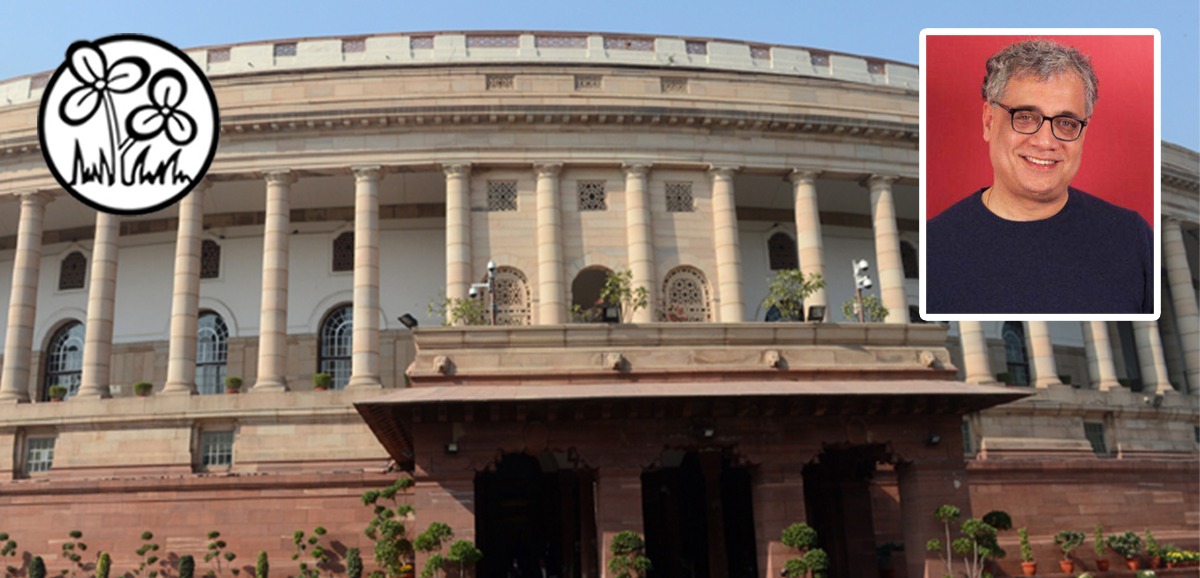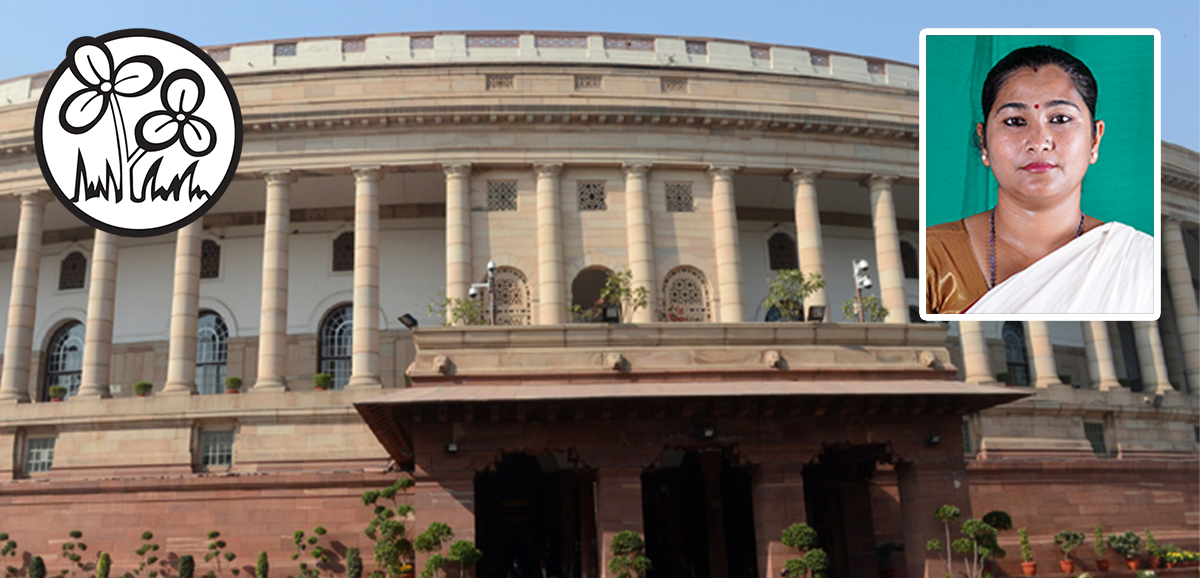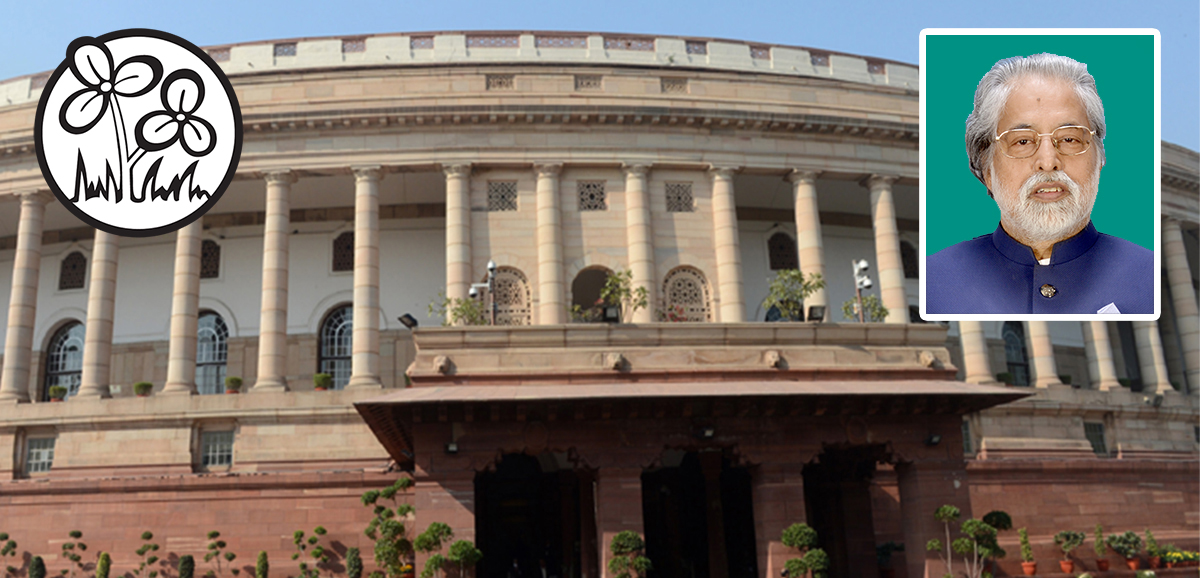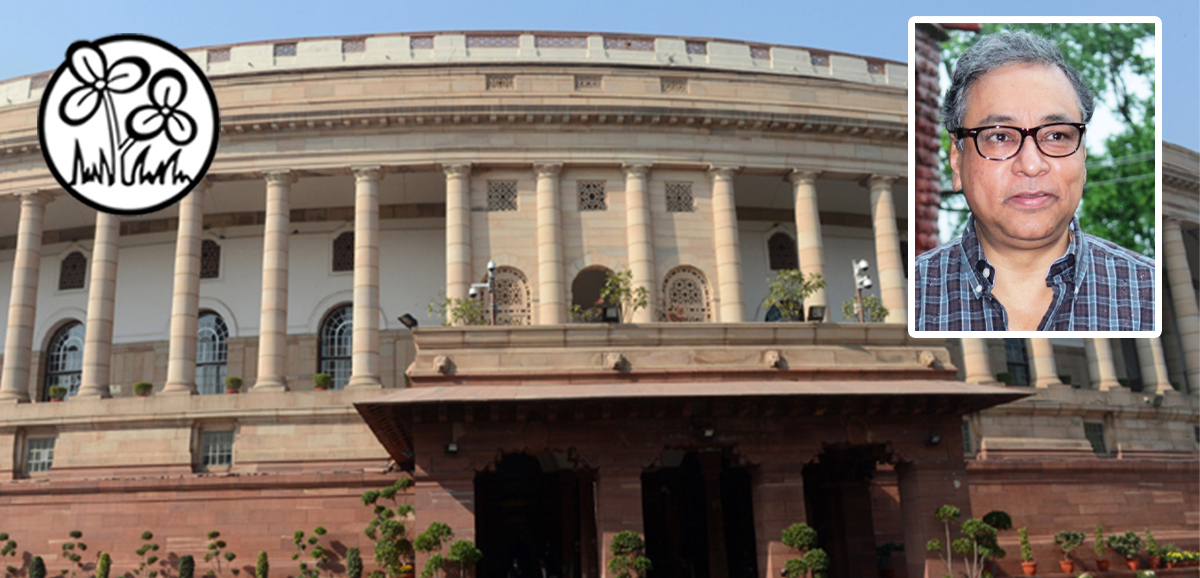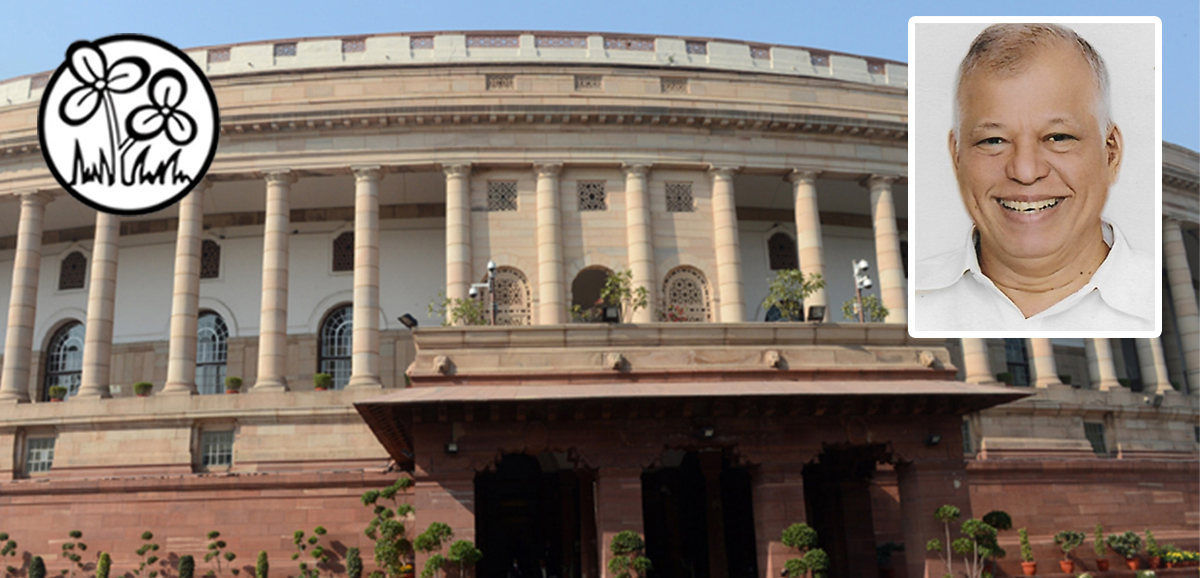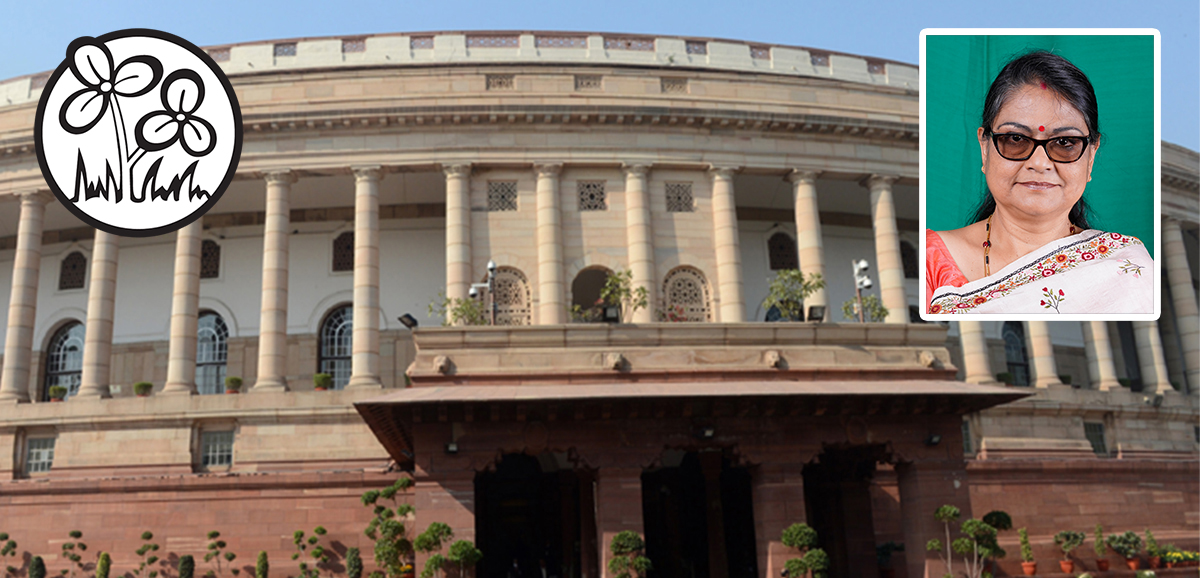Sir, this is the story of a young couple. They get up in the morning, quickly brush their teeth; 18 per cent GST on toothpaste. Then the man rushes in for a bucket bath; again 18 per cent GST on soap. While they get ready, someone hits on the door. The LPG man is waiting outside. Oh! Give me some Rs.1200. Then, they are on the scooter to work. Petrol prices! You know what it is. While they are rushing, they quickly stop because the child has got an exam tomorrow. So, pencil and eraser all are to be bought; even children are not spared; 18 per cent GST on these items. Then there is office time and murmura, what we call in Bengali mudi, is not spared; 5 per cent GST is on that. Then they go to office. The man goes to one office and the wife goes to another one. They realise the neighbour’s wife has to be taken to hospital; not spared; there is 5 per cent GST on room. Bad day! The lady calls up and tells the
husband that she is going to the bank. Bank! There is 18 per cent GST on the cheque book. So, by the time they come home, they stop for the tomatoes; up by 145 per cent. They are exhausted. They are back home. The lady and the man are quite exhausted, but the man says, “मोदी हैतो मुमिकन है।”And, what does the lady say? Lady’s Hindi is not very good. So, she says something in Bangla:∗”Flattened rice, puffed rice and batasha (sweet candy) **.”*”Flattened rice, puffed rice and batasha (sweet candy)/GST**.” Sir, I can’t translate that. That is not translatable. Now, let’s come to the first three numbers. I have three numbers for the Finance Minister and I have six direct points where I want her response when she responds. Let me explain what these three numbers are. The first number is 20. Now, ten years ago, when cess was collected by the Government, of the total cess and surcharge collected, 10 per cent was the
cess and surcharge. That was ten years ago. Now, that number has gone from 10 to 20 per cent. That means, the Central Government is sucking 20 per cent instead of 10 per cent from the States. That figure is Rs.4.81 lakh
crores. So, my first point to the Finance Minister, who will respond, is that you are doing this for all. For petroleum products — don’t talk about petroleum products — two-thirds of the total tax is cess and surcharge, which is collected by the Centre. So, stop this argument of पांच �पया यह, 6 �पया यह. Two-thirds is collected. That is the first response, and what is the Number? The number is 20. Regarding the second number, we all know about the retail inflation.
Regarding retail inflation, the RBI says that 6 per cent is okay. In the last two quarters, the retail inflation has been 7 per cent. So, there is trouble as regards retail inflation. So, 20 plus 7 is 27. Keep that number in mind. My third number today is 29. Why 29? It is about बेरोजगारी, unemployment. Twenty-nine per cent of youth in India do not have jobs. One out of three does not have job. The Finance Minister must respond. Seven lakh twenty-two thousand people have got jobs. What is my source? It is an answer in Lok Sabha a few months ago. Twenty-two crore people
applied. What is the number of people who got the jobs? Your own source says that it is about 7 lakh. That is my third number. Twenty per cent cess you are taking from the States; 7 per cent is the retail inflation; and, 29 per
cent is the youth unemployment. In the response, I would like the Finance Minister to dispute all these numbers. But, the interesting thing here, and it is very, very interesting, is that if you add the three numbers up – 20, 7 और
29 – एक नम्बर िमलता है, 56 इंच. So, 56 इंच is the number we can all understand, if you know what I mean. 56 इंच, right, Sir? The Finance Minister is quoting Raghuram Rajan on the floor of Parliament. I am sure the Finance Minister has not been well and I wish her a speedy recovery. I am sure she will come back to listen to the second part of my speech. It is good when the Finance Minister walks out, you know, I get under their skin. Right, Sir? …… मैंभी वॉक आउट क�ं गा न! Raghuram Rajan made that speech. Don’t selectively quote Raghuram Rajan. After he said what you said, and that was the point of his speech, “We must confront and defeat majoritarian authoritarianism.” Then, regarding the falling rupee, everybody knows about the falling rupee. Now, this is the third response that I want from the Finance Minister when she responds. We know that the rupee has jumped up 28 times. Inflation is at 7 per cent. Right? Now, listen to this. In the U.S., inflation is at 9 per cent. In India, inflation is at 7 per cent. If in the U.S., the inflation is at 9 per cent and in India it is at 7 per cent, undergraduate economics will tell you that the rupee should be appreciating to the dollar. I would like to know from the Finance Minister as to why the rupee is depreciating;
because in the U.S., 9 per cent is peaked off. Let us come to one more, again, a response from the Finance Minister. The Opposition MPs also know how to make political points and economic points. Give us a chance to speak. Now, let me come to my fourth point in her response. 2019-20 में एलपीजी स�ब्सडी िकतनी थी – 24 हजार करोड़। सर, 2021-22 मेंवह 24 हजार करोड़ की स�ब्सडी िकतनी कम हो गई? 2,400 नहीं, िसफर् 240 करोड़! फाइनेंस िमिनस्टर आइए और अपनेिरस्पाँस मेंइसका जवाब दीिजए। Let me now come to the issue of GST. From the Treasury Benches, Members are getting up here and misleading the whole House, misleading the whole country. जीएसटी मेंयह बोला था and all the States agreed. Not at
all! The Supreme Court has said, GST is a recommendatory body. Let us be very, very clear about this. Nothing is binding. It is advisory. Do not make this argument. It does not work. Sir, my next submission to the Finance Minister is that when the GST was introduced in 2016, the States were assured compensation for a period of five years. States have now written about increasing it. Sir, Covid was really bad for the economy. Have you considered the demand of the States to increase the compensation from five years to eight years or nine years or ten years? Please give us an answer on the floor of this House. These are the real issues. You cannot go on Noida TV channels and divert the issue
with minor, minor issues. We are talking about price rise. Let me come back on GST. So, what are you really doing? 1.5 lakh crore compensation over the next nine months! Where are the States going to generate this money from? Let me come to my last point on GST. Sir, I had the good fortune of being a Member of the Select Committee as my Party, AITC, had put me there. At that time, the revenue neutral rate was 16 per cent and based on that, all the GST rates were calculated. Now, the revenue neutral rate is down to 11 per cent. Why? It is because you have taken away 250 items which were luxury items and brought it down, and, you have gone in and taxed tooth paste, etc. That is the problem. They have to fix this, Sir. If you do not fix this, then, I am afraid this will be death of federalism. My next point is that the Opposition, my Party, AITC as well as other Parties took a very clear view on GST. The idea was great but we warned you in August, 2016, and, you can check the records of Parliament. We warned you and said that the implementation is the key and you made the complete hotch potch of implementation. Next time, we warned you in November, 2016. Forty-five minutes after the Prime Minister announced demonetisation, one lady, the Chief Minister of Bengal asked you to withdraw this draconian anti-people decision. But you did not listen. On the issue of farm laws, you did not listen. On the issue of handling of Covid, you did not listen. ∗ Sir, we heard a lot about यह �ी िदया, वह �ी िदया, अगर इतना �ी िदया, तो बंगाल मेंइतना क्यों हार गए? मैंपूछ रहा हूँिक क्यों हार गए? … Sir, it is taking my time.One minute! You have taken my three minutes.This is the second largest opposition party speaking here and you are saying that I have got one minute to speak. What is this, Sir?Sir, let me make the point. I have got only three very short points. I must respond to them so that they know why they lost because they think they win everything.
…(Interruptions)… मैंबताता हूं, ममता दीदी बंगाल की मुख्य मं�ी हैं, वेजो बोलती हैं, keeps her words. राइस �ी, रोहू�ी, दवाई �ी, इलाज मुफ्त, ‘मां कैं टीन’, पांच �पयेमेंखाना, िकसान इंश्योरेंस, सर, िकसान का भी एक प्वाइंट है। िकसानों के िलए बंगाल का मॉडल आप लोग सीख लीिजए, िकसान का इंश्योरेंस .. Sir, protect me.Sir, I need protection. Sir, if I may say, two MPs stood up in their seats in the morning and the House got adjourned. So, Sir, please protect me. Sir, please give me two minutes. I will conclude. For kisan insurance, the farmer does not have to pay the insurance. And I can go on with Laxmi Bhandar, Kanyashree, etc. Sir, I have two more points to make. I have made six clear points where I would like the Finance Minister to respond. Sir, the bigger point is why we had to wait. ैंने6 प्वांइट्स बोलेहैं, आप जवाब दीिजए।
Sir, we have discussed price rise with hard points. We have discussed GST. Now, why did it take us 38 days to have this discussion on price rise? Just one minute. We appeal to the Government, and genuinely appeal as a constructive opposition that firstly you have to acknowledge the problem. If you are not going to come here to acknowledge the problem, how can you fix the problem? Because you will throw 25 MPs out, you will not allow a discussion, and
then what happens? What is Parliament? Parliament is a congregation of the people, fighting for the Constitution. So, what they did was to remove Parliament outside. Sir, they removed Parliament outside and we, the congregation of the people, are still fighting for the Constitution. Sir, I want to end with quoting a very important person. Please allow me to make two small quotes, and I am looking forward to make short quotes. I have made six points for the FM but these are the two quotes and of somebody all of you respect. Here we go. The first one is on the rupee. “Rupee is not losing strength because its size has changed. It is because those sitting in Delhi are busy in corruption.” Sir, this is a quote Sir, I don’t know why they are getting upset. This is July, 2013 — Narendra Modi. Why are they
getting upset? Mr. Prime Minister, we agree with you. My second quote is on price rise. Let me finish without any disturbance. It is my last quote. “Common people are being affected by rising prices but the insensitive Central Government is making a mockery of the suffering of the poor.” — Mr. Modi, September, 2013. All I want to say to both these quotes. He said this in September, 2013. All I want to say for these two quotes is: Mr. Prime Minister, we completely agree with you. Thank you.
